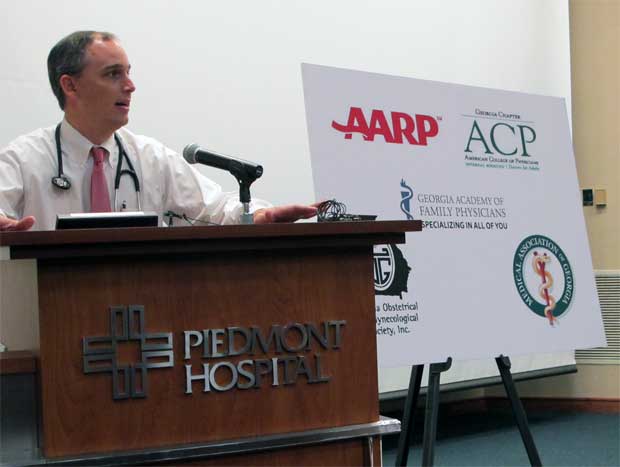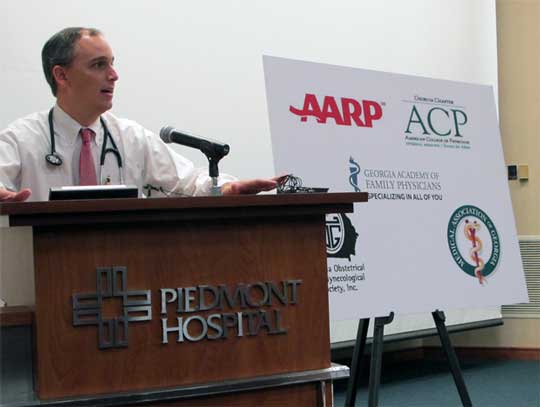
More than 80 percent of Georgia AARP members say they’re worried that doctors may stop treating older patients due to an impending Medicare pay cut to physicians, according to a new survey.
The survey of Georgia AARP members was released Thursday as physician groups and seniors gathered at a news conference at Atlanta’s Piedmont Hospital to urge Congress to halt a 25 percent Medicare pay reduction to doctors, scheduled to take effect Jan. 1.
That pay cut would force many physicians to drop out of the Medicare program, said leaders of doctors organizations, who advocated for a 12-month fix to the pay problem.
Inaction by Congress would have ‘’a disastrous effect on patients in Georgia,’’ said Dr. Sandra Reed, president-elect of the Medical Association of Georgia. “Some of our most vulnerable patients will struggle to find a doctor in their hour of need.’’
Medicare, the federal insurance program for people 65 and older and the disabled, covers more than 1 million Georgians, and 47 million people nationally. The program is expected to spend $519 billion this year and balloon to more than $900 billion by 2020. To help curb that spending growth, leaders of a deficit reduction panel are proposing requiring beneficiaries to pay a larger share of Medicare costs.
Costly concerns
The so-called ‘’doc pay fix’’ issue has flared repeatedly in Congress, with reimbursement cuts blocked several times in recent years. The most recent such action was a one-month extension of current rates passed in November. That postponement cost $1 billion over 10 years, and was offset by changes in Medicare reimbursement for outpatient therapy services.
The doctor pay formula stems from a 1997 budget-balancing law that requires physicians’ reimbursement rates from Medicare to be adjusted every year, in order to keep the program fiscally sound.
Physician groups and AARP are pushing for a permanent solution to the pay problem. To eliminate the doctor pay formula would cost an estimated $250 billion to $300 billion over a decade.
AARP surveyed members in 13 other states about the physician payment issue. Republicans showed greater concern about the doctor pay issue than members of other parties in all those states, said Will Phillips, associate state director for advocacy for AARP Georgia. “Our members need peace of mind in accessing care. They need to know the docs are going to be there for them.’’
The survey of 800 Georgia AARP members aged 60 and older found that worry about doctors dropping out of Medicare cut across party lines – 77 percent of Democrats, 88 percent of Republicans and 80 percent of independents. Conducted in late November, the survey also found 83 percent of Georgia AARP members on Medicare were concerned they would have trouble finding a new doctor if their current physician no longer accepted Medicare.
Grim predictions
Many older Georgians already struggle to find a physician who will accept Medicare patients, said Dr. Harry Strothers, president of the Georgia Academy of Family Physicians. If the Medicare pay cuts are implemented, he said, one of every 10 family physicians ‘’will have to close their practices.’’
Added Dr. Ramon Suarez, past president of the Georgia Obstetrical and Gynecological Society: “Shame on the Congress, shame on the president, for putting access to care for seniors at risk.’’
AARP member Barry Reid, 71, of Tucker says he had a hopeless feeling when his endocrinologist stopped seeing him and other Medicare patients four years ago. “My doctor explained that he would be losing money to see us, ‘’ said Reid, who has diabetes. He said he managed to find another specialist to treat him.
Unless something is done, seniors’ access to physicians will worsen greatly, he said.
Lawmakers in Washington, Reid said, “owe us a solution.’’

